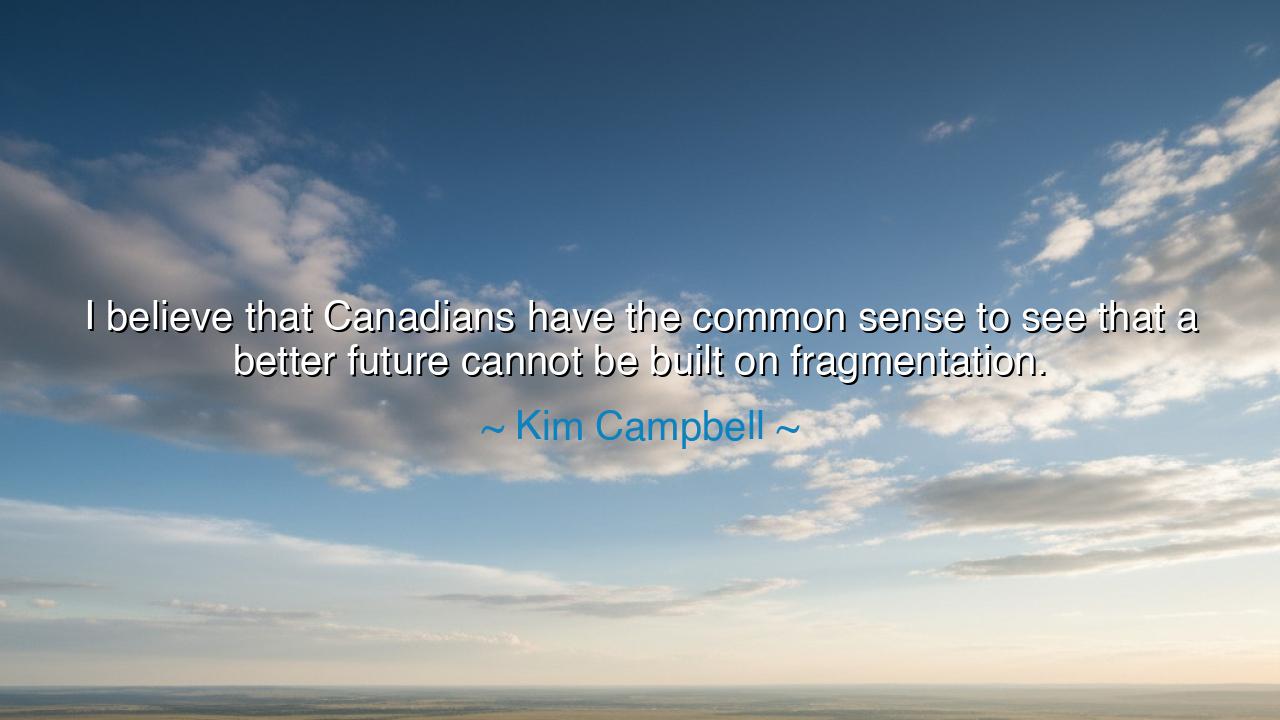
I believe that Canadians have the common sense to see that a
I believe that Canadians have the common sense to see that a better future cannot be built on fragmentation.






In the annals of history, societies have often faced the delicate balance between unity and division. The words of Kim Campbell, "I believe that Canadians have the common sense to see that a better future cannot be built on fragmentation," speak to a profound and timeless truth about the necessity of solidarity for the future of any community, nation, or civilization. To build a better future, whether for Canada or any nation, requires a recognition that fragmentation—whether political, social, or cultural—undermines the strength that comes from a unified vision. It is through unity and the shared goals of a people that societies can rise above their challenges and face the future with hope and resolve.
The ancients understood this principle well. In ancient Greece, the city-states were often at odds, divided by their own interests, leading to constant conflicts, such as the Peloponnesian War. Yet, even amidst the turbulence, there were moments when the Greek city-states came together to face common enemies, most famously during the Persian Wars. Leaders like Themistocles understood that the future of the Greek world depended on unity and not on internal fragmentation. The victory at the Battle of Salamis, where a united Greek navy defeated the Persians, is a testament to the power of cooperation and common purpose. Just as Themistocles led a divided Greece to triumph, Campbell’s words emphasize that only through a united approach can a nation achieve greatness.
In Rome, the idea of unity was also central to the empire's power and longevity. The Roman concept of the Res Publica, or public affairs, was rooted in the idea that the collective well-being of the Roman people should transcend personal or regional interests. Cicero, a staunch defender of the Republic, often warned against the fragmentation of Roman society, recognizing that the true strength of the Roman state lay in the unity of its citizens. However, as Rome expanded, its internal divisions grew, and the collapse of the Republic and the rise of imperial power reflected the dangers of fragmentation—be it in politics, social divisions, or the erosion of common values. Campbell echoes this ancient wisdom when she speaks against fragmentation in modern Canada, understanding that the future of any nation depends on its ability to remain unified in purpose.
The lessons from both Greece and Rome show us that fragmentation not only weakens a nation internally but also makes it vulnerable to external threats. The middle ages also provide examples of societies where division led to decline. In medieval Europe, the fracturing of the once-unified Roman Empire into countless kingdoms left the region vulnerable to invasions by the Vikings, Magyars, and Saracens. The Holy Roman Empire, despite its name, struggled with internal division and disunity, which contributed to its eventual collapse. Just as these ancient empires learned the hard way, so too must modern societies recognize that without unity, their very future is at risk.
In more recent history, Canada itself faced moments of intense division. The Quebec Referendum in 1995, when the province of Quebec came close to voting for independence, is a vivid example of how fragmentation can threaten the unity of a nation. However, Canadians—led by figures such as Jean Chrétien—recognized the importance of unity, working to bridge gaps and ensure that Quebec remained a part of the broader Canadian family. Campbell’s words are a reflection of this historical truth: division—whether political, social, or cultural—can tear a nation apart, while unity provides the foundation for a thriving future.
The lesson of Campbell’s quote is one of vision and collective effort. The future of any nation, like that of Canada, is not built on the fragmentation of its people, but on their shared values, goals, and commitments. If a nation is to thrive, its people must work together in the spirit of cooperation, acknowledging that their individual interests are part of a greater whole. This means setting aside personal or regional differences to focus on the greater good—to recognize that a united future is far more powerful than a fragmented one.
In practical terms, this means actively engaging in the building of bridges between different communities, whether those divisions are political, cultural, or ideological. It means focusing on what unites, rather than divides, and recognizing that the strength of a nation lies in its ability to move forward together. This is not just about political cooperation, but about fostering a spirit of inclusivity, respect, and mutual support across all levels of society. Just as the ancients knew that strength comes from unity, so must we continue to seek common ground, even in the face of deep differences. By doing so, we can ensure that our societies remain strong, resilient, and capable of facing whatever challenges the future may bring.
The wisdom of Campbell reminds us that the future is never built on isolation or division but on the shared commitment of all people to work together for the common good. Just as the Greeks, Romans, and other ancient civilizations learned, so too must we recognize that unity is the cornerstone of a prosperous and enduring future. Let us take this lesson to heart, ensuring that we continue to strive for a world where division gives way to cooperation, and where the strength of the collective outweighs the desires of the individual. In this, we shall build a future worthy of the sacrifices and hopes of those who came before us.






AAdministratorAdministrator
Welcome, honored guests. Please leave a comment, we will respond soon